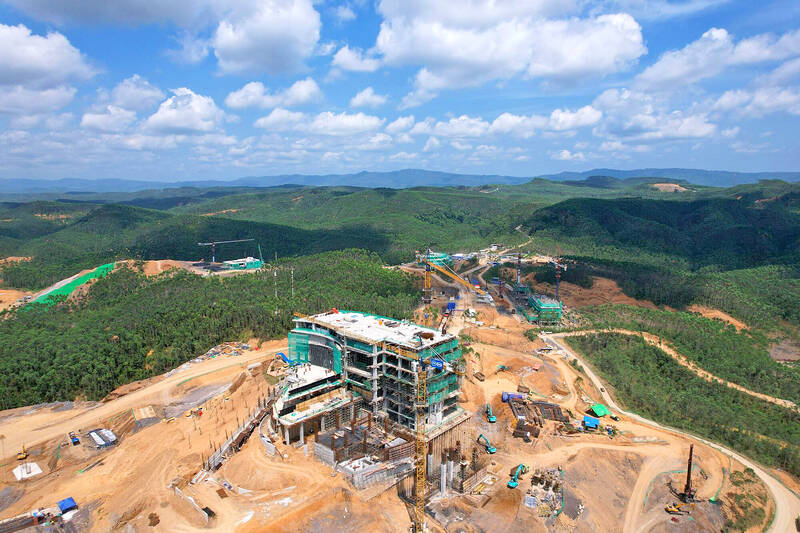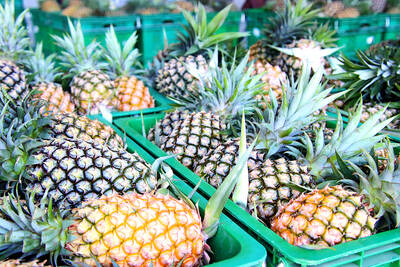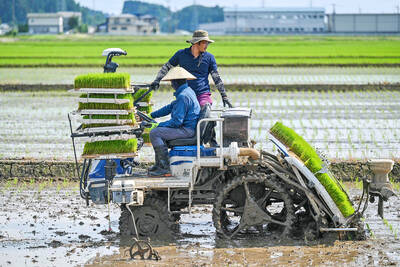A: What else can we look forward to this year?
B: According to CNN, the next six big things are: 13. New books, 14. A new capital city for Indonesia, 15. A new outlook on Catholic faith, 16. More artificial intelligence, 17. New video games, and 18. A historic election — in Mexico.
A: I know. Indonesia will relocate its capital city to Nusantara.

Photo: Bloomberg / 照片:彭博社
B: The last six big things are: 19. Amazing art, 20. Malaria breakthroughs, 21. Mosquitoes that are actually helpful, 22. Pandemic progress, 23. A better job market, and 24. A new day.
A: Yeah, a new year always brings a new start.
A: 今年還有哪些令人期待的大事?
B: 根據CNN接下來6件是︰13.新書、14.印尼新首都、15.天主教新觀點、16.更多人工智慧、17.新電玩、18.墨西哥歷史性選舉。
A: 我知道,印尼將遷都「努山塔拉」。
B: 最後6件則是︰19.驚人的藝術、20.瘧疾防制大突破、21.有益的蚊子、22.疫情進展、23.工作市場回溫、24.新的開始。
A: 沒錯,新的一年也帶來了新的開始!
(By Eddy Chang, Taipei Times/台北時報張聖恩)

A: What types of fruit enzymes should we take to help reduce eye floaters? B: According to a study published in the “Applied Sciences” journal by Taiwanese ophthalmologist Horng Chi-ting, pineapple, papaya and fig supplements can improve symptoms. A: Pineapples are in season now, so you should munch on more of those to get rid of floaters. B: Not quite. Enzymes can be damaged by our stomach acid if we eat the fruit directly. The doctor says taking fruit enzyme capsules is better for absorption. A: Most importantly, we should reduce our use of personal electronics to prevent floaters from

Rice is essential to Japanese culture, tradition and politics. People take pride in the oval-shaped sticky Japonica grain, which is still a staple even though total consumption has fallen over the decades. But since last summer, prices have soared as supplies have fallen short of demand. The government has long paid farmers to cut back on rice acreage, and change to other crops to keep rice prices relatively high. To cope with shortfalls this year, the government has released rice reserves. But the grain has been slow to reach supermarket shelves. Anger over that was part of the reason the Agriculture Minister

In Taiwan, 7-Eleven convenience stores can be found on almost every street corner. With over 84,600 stores across 20 countries, 7-Eleven has more locations than any other retail business on Earth. For millions of people, the chain is an important part of daily life, providing coffee, quick meals, and essential items for those __1__. The history of 7-Eleven began nearly 100 years ago in Dallas, Texas. In 1927, the Southland Ice Company began selling blocks of ice that were used to keep fridges cool. Shortly after opening, the company __2__ its offerings to include groceries like milk, eggs, and

Continued from yesterday(延續自昨日) https://www.taipeitimes.com/News/lang In 1946, the company adopted the name 7-Eleven to reflect its newly extended __3__, from 7am to 11pm, a novel concept at the time. As a rapidly growing company, it began offering franchise opportunities in the 1960s. In 1974, the first 7-Eleven in Japan was opened by the supermarket company Ito-Yokado. The Japanese franchises were __4__ successful that by 1991, Ito-Yokado was able to acquire a 70 percent stake in Southland Corporation. Its investments eventually resulted in full ownership of 7-Eleven, which paved the way for the Japanese company to enter the international market. Since then, 7-Eleven